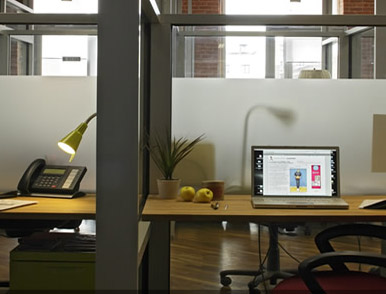By Carly Clark
Each month we will profile a business that is innovating in its field, using design as a strategic tool or embracing sustainability as a way of life. We hope these profiles will teach you, inspire you and support you in your own career or business.
10 Questions for Green Desk
Green Desk, located in Brooklyn, New York, offers affordable office rentals to small businesses. So, what’s their angle? Green Desk places much importance on being environmentally responsible, offering short-term monthly leases and providing well-designed workspaces in a cool Brooklyn neighborhood. Green Desk’s sustainability practices include everything from recycled furniture and no-VOC finishes to powering the building from renewable energy sources. Plans for the future include solar panels, shared bicycles and green space. Green Desk even won the honor of Best Cubicle Rental in 2009 from New York Magazine’s Best of New York feature.
I have first-hand experience with Green Desk, having worked there for several months while my organization awaited the renovation of our permanent office space. During our brief stay, we met many other small businesses, entrepreneurs and organizations working and growing both locally and nationally. In this era of recession, Green Desk is a refreshing place bubbling with the energy of small businesses.
The most interesting thing about Green Desk, perhaps, is Green Desk itself. Miguel McKelvey, one of the founders, gave us some insight about the inspiration behind Green Desk and what it takes to make it a success…

Q1: When did the business start?
Green Desk opened in May 2008, but we were working on it for several months before that.
Q2: How did the idea come about?
Green Desk was founded by Miguel McKelvey, Adam Neumann, Gil Haklay and Jack Guttman (who owns 155 Water St – where Green Desk is located). Miguel, Adam and Gil were long-time tenants at 68 Jay St (another building owned by Guttman). We developed the idea both in response to the need we saw for more flexible work space solutions, and from our own experience as entrepreneurs – knowing how much of a hassle it can be to start up a business and get all the stuff you need like copiers, printers, phone systems, etc. There were so many people coming into 68 Jay who would rent larger spaces, not knowing how quickly their businesses would grow, and then start trying to sublet portions of their offices to freelancers to fill up the extra space. It was obvious that there was a market for smaller spaces with month-to-month lease terms.
Q3: How did the idea get implemented and turned into a business
We discussed the idea for a long time, and Adam asked Jack to partner with us. While we had experience as entrepreneurs and architectural designers, we hadn’t done anything like Green Desk before. Luckily, because Jack owned the building, he was able to give Green Desk good lease terms, and we were able to try out the concept on one floor, without committing to leasing the whole building. The response was overwhelming from the minute we put an ad on craigslist and a sign in the neighborhood, so we were confident we were on to something.
Q4: What do you consider your unique selling proposition? In other words, what makes your business special or different?
Making an effort to be environmentally responsible from the beginning, and calling our business Green Desk, was certainly a differentiator, but honestly the thing that I think differentiates Green Desk from competitors is the clean and simple design of the space. After visiting some other shared office spaces, we knew that we had to avoid the corporate feeling of typical office furniture systems, and it makes a big difference to walk into a space that feels light and open instead of dark and depressing. It seems like a small thing, but having a solid wood desk really is much better than a chunk of particle board preserved with formaldehyde and glued to a piece of plastic laminate – which is what you get in a typical office system.
Q5: Did you consciously incorporate sustainability into your business model?
Once we came to a general consensus that we were going to create a shared office space, I went home, sat on the couch and spent the next 40 waking hours putting together the name, logo and website. What’s weird is that it never occurred to me to be anything other than green – I was listing the efforts we’d be making to be sustainable before I had even thought about practical matters, like what kind of Internet service we would provide. I just don’t think it’s possible for me to think about business, or day-to-day life for that matter, without trying to incorporate efforts toward sustainability.
Q6: Do you consciously incorporate design into your business? How?
Gil and I are architectural designers, so it was natural for us to be thinking about design aspects at Green Desk – but one thing we did realize is that it’s much easier to spend clients’ money than it was our own. Construction and furniture are really expensive, but we tried to create a clean and simple esthetic that is affordable and durable. As I mentioned before, I think we were successful in implementing a recognizable and effective design concept, which became a business differentiator, even though we had a limited budget. I think it’s essential to consider design in a business venture, no matter what the field.
Q7: Do you have plans for the future?
Green Desk continues to expand in Dumbo – with more space opening at 68 Jay St (across the street from 155 Water St). As long as the demand continues to grow, there’s no reason not to grow with it.
Q8: What’s the most fun thing about running/helping to run a business?
We get to work with some of the coolest small businesses (and organizations) in Brooklyn. We’re surrounded by entrepreneurs and innovators from an incredibly diverse array of industries. Being around them, and doing our best to support their success, is incredibly fulfilling.
Q9: What caught you by surprise about running or starting a business?
The number of things that caught us by surprise would be long and diverse, but the greatest challenge in starting up was probably the realization that we absolutely could not fail in providing basic services like Internet and phones. In a normal company, if the internet goes down, then employees may be less productive, but they’re not really going to complain about it too much because it’s their employer’s responsibility to fix. In our case, we have 200 customers in the building – all counting on consistent Internet service – so if the Internet goes down we hear about it immediately and continue to hear about it until it’s fixed. The hours I spent on the phone with the various service providers when the service was down were some of the most stressful of my entire life.
Q10: Any other advice or information?
When starting a business, I think the best thing you can do is be completely confident in your situation in life – meaning that if you fail, even if you go bankrupt and lose your entire life savings, you know that you’ll land on solid ground. You have to be fearless or else you’ll never be able to truly commit and do everything it takes so succeed.
Carly Clark is the Director of Operations and Creative Director of the Livable Streets Initiative, where she both helps manage the daily operations and leads the visual design of Streetsblog, Streetfilms and Livable Streets Education. The Livable Streets Initiative works to make our city streets safer, cleaner and more fun, while reducing our dependence on cars. When Carly isn’t working to improve our urban environment, she’s busy obsessing about the home environment on her blog, Mochi Home.
Click here to read more articles like this one published in the current issue of Catalyst SDR.




